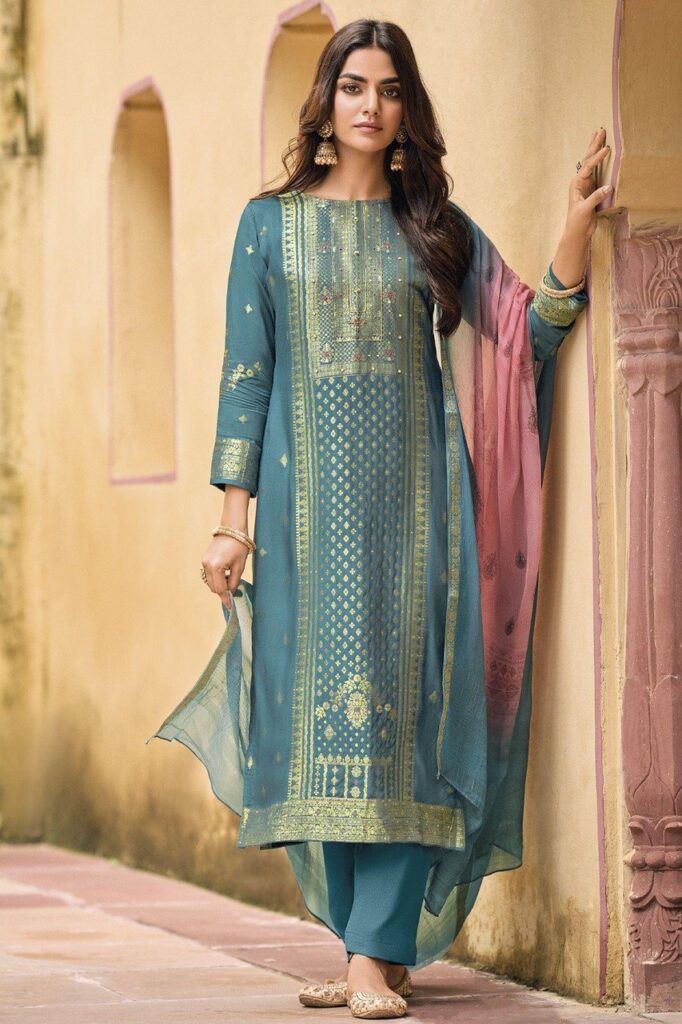 In this blog we have covered 12 ways to Identify reliable wholesale ethnic wear suppliers. For retailers and boutique owners, the ethnic clothing sector is a profitable business opportunity because of its size, vibrancy, and constant evolution. However, working with the appropriate ethnic wear wholesale suppliers is essential if you want to succeed in this cutthroat market. Building confidence with your consumers requires competitive pricing, fast delivery, and consistent quality, all of which are guaranteed by a reputable ethnic wear wholesale suppliers. https://thekhuranatextile.com/contact/. This comprehensive guide will assist you in finding trustworthy ethnic wear wholesale suppliers such as lehengas, suits, and sarees.
In this blog we have covered 12 ways to Identify reliable wholesale ethnic wear suppliers. For retailers and boutique owners, the ethnic clothing sector is a profitable business opportunity because of its size, vibrancy, and constant evolution. However, working with the appropriate ethnic wear wholesale suppliers is essential if you want to succeed in this cutthroat market. Building confidence with your consumers requires competitive pricing, fast delivery, and consistent quality, all of which are guaranteed by a reputable ethnic wear wholesale suppliers. https://thekhuranatextile.com/contact/. This comprehensive guide will assist you in finding trustworthy ethnic wear wholesale suppliers such as lehengas, suits, and sarees.
1. Research Thoroughly
First by doing a comprehensive investigation to find possible vendors. Make use of trade websites, markets, and internet directories such as:
- IndiaMART
- Trade India
- Alibaba
- Local reliable ethnic wear wholesale suppliers markets (such as those in Ludhiana for suits, Jaipur for lehengas, and Surat for sarees)
To meet suppliers face-to-face, go to trade shows and exhibits. You can learn more about the supplier’s reputation and product line by networking at these events.
2. Evaluate the wholesale ethnic wear Supplier’s Reputation
Reliability can be inferred from a ethnic wear wholesale supplier’s reputation. Here are some important things to think about:
- Online Reviews: Examine ratings and reviews on websites such as trade directories, Google, and Justdial.
- Request suggestions:- from other boutique owners or retailers in your network.
- Business longevity: A provider who has been in business for a number of years is probably more trustworthy.
3. Verify Product Quality
In the ethnic clothing industry, quality is a must. Prior to choosing a supplier:
- Request Samples: To evaluate the quality of the fabric, embroidery, and stitching, order samples of their lehengas, sarees, and suits.
- Verify Certifications: Make sure the materials and production meet industry standards.
- Examine the package:- to make sure the clothes arrive in perfect shape.
4. Assess Pricing and Payment Terms
Your profit margins are directly impacted by wholesale prices. Examine costs from several vendors to find affordable pricing without sacrificing quality. Furthermore:
- Ask for discounts: Better prices should be offered for larger orders.
- Payment Flexibility: Choose vendors who provide fair terms for payments, like credit alternatives or partial upfront payments.
- Unexpected Fees: Clearly state shipping, taxes, and other extra expenses up front.
5. Evaluate Delivery Timelines and Logistics
Meeting consumer expectations requires timely delivery, particularly during wedding months or holiday seasons. Consult the supplier:
- Delivery Schedules: Verify their typical delivery schedules for large orders.
- Shipping Partners: Verify whether they work with reputable logistics or courier services.
- Tracking Systems: Verify if they offer cargo tracking capabilities.
6. Examine Product Variety
To satisfy a wide spectrum of consumer interests, a varied product line is necessary. Seek vendors who provide:
- many types of sarees (such as chiffon, banarasi, and kanjeevaram)
- Various suit styles (such as palazzo, straight-cut, and Anarkali sets)
- Stylish lehengas for events and weddings
- You can stock adaptable solutions thanks to this variety, which guarantees that you draw in a wider audience.
7. Check for Customization Options
In ethnic clothing, customization is becoming more and more popular. Find out if the provider is able to:
- Offer personalized patterns or designs.
- Embroider branding or emblems onto clothing.
- Adapt sizes to meet the demands of individual customers.
- Customizable ethnic wear wholesale suppliers can make you stand apart in a crowded market.
8. Analyze Communication and Customer Service
The foundation of a successful wholesale supplier ethnic wear relationship is effective communication. A trustworthy vendor needs to:
- Answer questions quickly.
- Give precise details about your policies and offerings.
- Take the initiative to resolve problems.
- In the early phases of the investigation, gauge their level of responsiveness.
9. Request References
Request references from the supplier’s current customers. Speak with these customers to:
- Check the dependability of the source.
- Find out about their delivery, quality, and service experiences.
- Getting good reviews from other stores can boost your confidence in your selection.
10. Start with Small Orders
Use a smaller order to test the source before placing a large bulk order. This enables you to:
- Consider their service.
- Evaluate the quality of the product.
- Verify on-time delivery
- Building a relationship with the provider and reducing risk are two benefits of starting small.
11. Look for Long-Term Partnerships
Long-term partnerships are valued by trustworthy providers. Keep an eye out for indicators indicating a supplier is considering a cooperation, like:
- Over time, consistent quality
- Willingness to change to meet your needs
- Giving loyal customers discounts
12. Legal Agreements and Documentation
Make sure that every transaction is recorded in order to safeguard your company. Important documents consist of:
- Purchase contracts
- invoices that include terms, pricing, and quantities
- Policies for returns or replacements
- A formal agreement guarantees clarity and helps prevent disagreements.
Finding a trustworthy ethnic wear wholesale supplier requires careful consideration, communication, and investigation. You may build solid relationships that support the growth of your company by following these steps. In your quest to provide customers with high-quality ethnic clothing, keep in mind that the ideal provider is more than just a vendor; they are an invaluable ally.
FOR DEALING IN ETHNIC WEAR WHOLESALE SUPPLIERS YOU CAN CONTACT US :-https://thekhuranatextile.com/contact/
